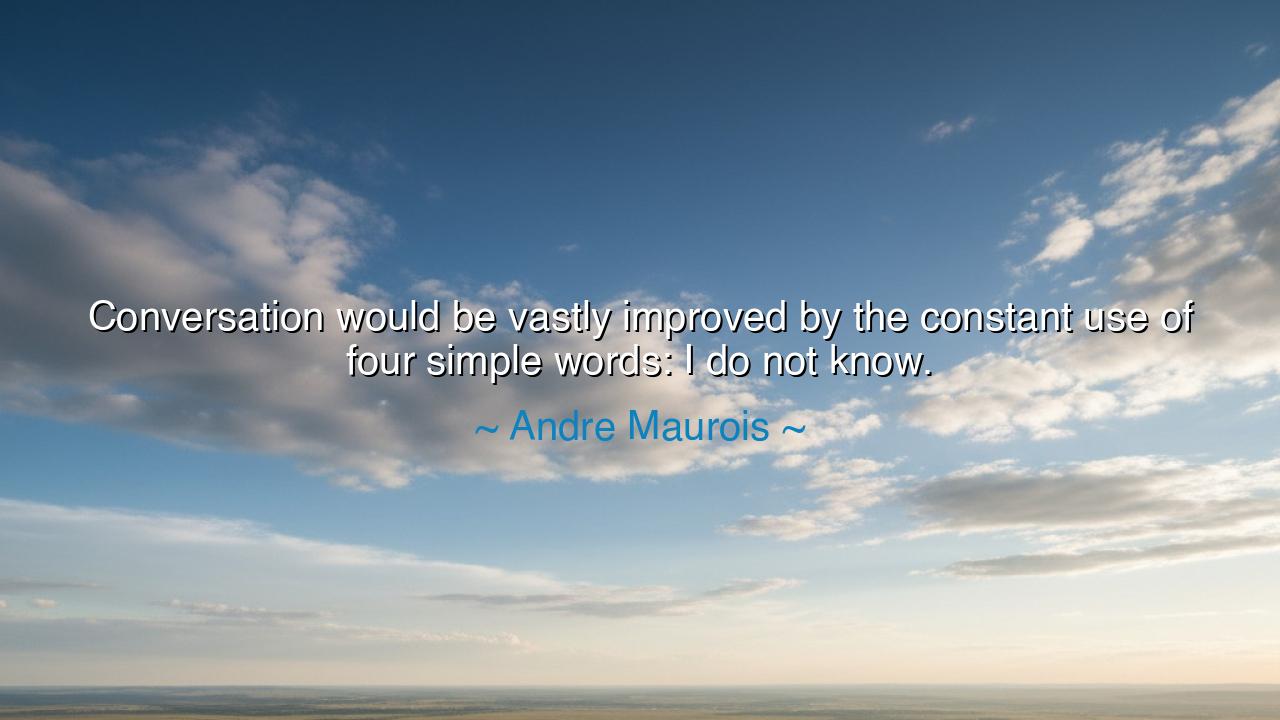
Conversation would be vastly improved by the constant use of four
Conversation would be vastly improved by the constant use of four simple words: I do not know.






“Conversation would be vastly improved by the constant use of four simple words: I do not know.” — in this quiet, profound observation, André Maurois, the French author and moral philosopher, reveals a truth both humble and revolutionary. Though his tone is gentle, his meaning cuts to the heart of human folly: that much of our discourse — in politics, in science, in friendship, even in love — suffers not from ignorance itself, but from the fear of admitting ignorance. With these four words, I do not know, Maurois calls humanity back to the ancient virtue of humility, the mother of all wisdom.
For in every age, the greatest barrier to truth has not been the limits of knowledge, but the arrogance of presumption. The man who cannot say I do not know closes the gates of learning upon himself. The woman who clings to false certainty mistakes pride for strength and opinion for truth. Maurois reminds us that conversation — that sacred meeting of minds — can only thrive when both sides are free from vanity. To say I do not know is to open a door; to pretend we know is to wall it shut. The phrase, small as it seems, is a gesture of courage — for only the brave admit uncertainty.
This wisdom has its roots in the oldest traditions of philosophy. The Oracle of Delphi once proclaimed that Socrates was the wisest of all men. When told this, Socrates laughed, for he believed himself ignorant. Yet in time he understood the oracle’s meaning: that true wisdom lies not in knowing, but in knowing that you do not know. From that humility came the birth of Western philosophy itself. Socrates questioned kings and poets alike, not to humiliate them, but to reveal how little they truly understood — and how much they might yet discover. Thus, the words I do not know became not a confession of weakness, but the beginning of enlightenment.
History offers many such lessons. Consider the case of Galileo Galilei, who stood before the Church, accused of heresy for saying that the Earth moves around the Sun. His persecutors were not ignorant — they were certain. Their certainty, rooted in pride, blinded them to new truth. Galileo, by contrast, represented the humility of science — the willingness to question, to observe, to admit that nature’s mysteries exceed human grasp. It is always certainty that kills wisdom, while doubt — patient, reverent doubt — gives birth to progress.
Maurois, writing in the twentieth century, had seen the devastation wrought by men who mistook conviction for truth. The wars of his time were fueled by ideologies that refused to say I do not know. In every dictator, every zealot, every fanatic, he saw the same sickness: the terror of uncertainty disguised as faith. His call for those four words was a call for peace — not only in conversation, but in the soul itself. For when people cease to admit ignorance, dialogue becomes battle, and the search for truth turns to the imposition of dogma.
And yet, there is beauty in what he proposes. The phrase I do not know does not end the conversation — it purifies it. It invites others to think, to explore, to teach and to learn together. It transforms discourse from competition into collaboration. Imagine, says Maurois, a world where scholars, leaders, and lovers alike could say these words freely — how much gentler would our arguments be, how much more truthful our discoveries, how much deeper our mutual respect. For truth grows only in the soil of humility.
The lesson, then, is clear: do not fear the limits of your knowledge; fear instead the pretense of knowing. In your speech, your work, and your relationships, make space for uncertainty. When you say I do not know, you are not diminishing your worth — you are elevating your integrity. You are making room for wisdom to enter. The truly wise do not rush to speak, for they know that silence and sincerity are often truer than eloquence without understanding.
So remember, O seeker of truth — the four most powerful words are not those that declare, but those that inquire. To say I do not know is to honor both truth and humility; it is to stand where knowledge begins, not ends. As André Maurois teaches, let your conversations be guided not by pride of mind but by purity of heart. For in admitting what you do not know, you open yourself to all that you might yet learn — and in that openness lies the beginning of wisdom eternal.






AAdministratorAdministrator
Welcome, honored guests. Please leave a comment, we will respond soon